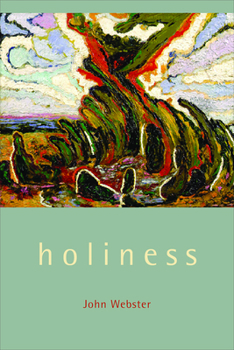Holiness
Integrating biblical studies, theology, and practical application, John Webster provides a thoroughgoing trinitarian understanding of God's holiness with highly relevant results. According to Webster, God's holiness is known not in his simple transcendence but in his gracious and free relationship to his people. Such holiness finds an echo in the holiness of the Christian community, especially in worship and witness, and in the life of the individual...
Format:Paperback
Language:English
ISBN:0802822150
ISBN13:9780802822154
Release Date:September 2003
Publisher:William B. Eerdmans Publishing Company
Length:124 Pages
Weight:0.40 lbs.
Dimensions:0.4" x 5.4" x 8.7"
Customer Reviews
3 ratings
Masterful and Edifying
Published by Thriftbooks.com User , 14 years ago
At present, I'm a third year Wheaton College student majoring in Theology. Anyone familiar with John Webster knows to expect clarity and powerful insights. I bought this book searching for meaning in the Christian truth of God's holiness. I bought it looking to grow. I confess that I bought it seeking a pastor for an author. Webster introduces his book saying that this book is not meant to be pastoral but scholarly. Of all that I've read of Webster, this is the first time I can say I think that he is wrong! The book has had significant impact on my life. His delivery is broken down into accessible portions and his content is, as always, insightful, challenging and edifying. His final chapter on the holiness of the Christian has had great impact on me, even though it is meant to be part of a scholarly discourse. Anyone looking for a stronger grasp on the sometimes elusive issues of the holiness of Scripture, of God, of the Church, and of the Christian will want to have consulted one of the best theologians of our day: Webster meets those needs for both the scholar and the supplicant.
A solid systematic treatment of a neglected doctrine
Published by Thriftbooks.com User , 14 years ago
This is a book of considerable depth despite being only one hundred pages long. Systematic theologians have not always been strong on the doctrine of holiness so Webster's contribution is very welcome. This is "confessional" theology, confident in God's Trinitarian self-revelation. It bears the characteristically Reformed and Barthian emphasis on what is usually called "positional holiness" and also shares Barth's nervousness about the piety of the sanctified. Though its dominant note is positional holiness it avoids any antinomian implication by stressing the genuine godliness of the elect. As well as covering the Holiness of God, the Holiness of the Church and the Holiness of the Believer, perhaps the most fascinating chapter is the first on the Holiness of Theology itself. It will need to be read slowly, carefully, and thoughtfully, but this book makes a great contribution to contemporary discussion on the doctrine of holiness and is highly recommended.
A holy task
Published by Thriftbooks.com User , 20 years ago
John Webster believes that theology is an office of the church. Theology is not, for Webster as for many modern theologians, a dispassionate and removed intellectual exercise; it is also not merely descriptive and emotive statements without reasonable methodology and content. Theology's task is to understand God's creation in certain contexts for certain purposes, and for that reason, it belongs to the people of God. However, Webster sets himself apart from much of current theological processes by focusing not on the conversational/correlative or the comparative, but on the dogmatic development within the guidelines of the church and the church's text, the Bible. To this extent, some theologians and Christians in the mainline may find the text difficult and narrow. On the other hand, it is worthwhile to follow the development, as Webster describes, more intensive before it becomes extensive. (One might say here it gets deeper rather than wider.) The main task for this short series of essays is to look at the ideas of holiness at relating to God, church, Christians, and the theological task itself. It starts off with certain presumptions which it takes as axioms and does not try to prove -- God exists, the Bible is the word of God, God's being is Trinitarian, etc. This is a fairly standard litany of orthodox Christian beliefs, so there is not a great stretch. Webster looks at the dogmatic content -- this is not metaphysics or pastoral, mystical or moralistic (although at certain points in any theology, and this is no different, there will be points that touch on these aspects). Webster begins with a chapter on method, looking at the different aspects and relationships of Christian theology. Perhaps in his most telling statement, Webster sets the theological stage as the place where reason is called before God, rather than the other way round. Theology is communal, prayerful, and above all confessional. Webster also has at the conclusion of this chapter a litany of that which theology is not: it is not a means of grace, it is not a sacrament, etc. There is much to argue against here, in the final paragraph of this section -- he makes the statement that 'Theology is not inspired', which I would argue strongly against; not knowing his operative definitions, however, I hesitate to offer a criticism, as we might be talking at cross-purposes.The following chapters look at content -- the holiness of God, Church, and the Christian. Using the ideas developed in the first chapter, and drawing on material from the Bible and the church, Webster sets out ways to consider holiness. Holiness is a relationship with God that can be communal or individual. In his conclusion, Webster looks at different theories of identity and self, and draws the conclusion that both the church and society need conversion that is unlikely to come through any form of rational, intellectual efforts, but through prayer and the type of conversion of life more akin to





